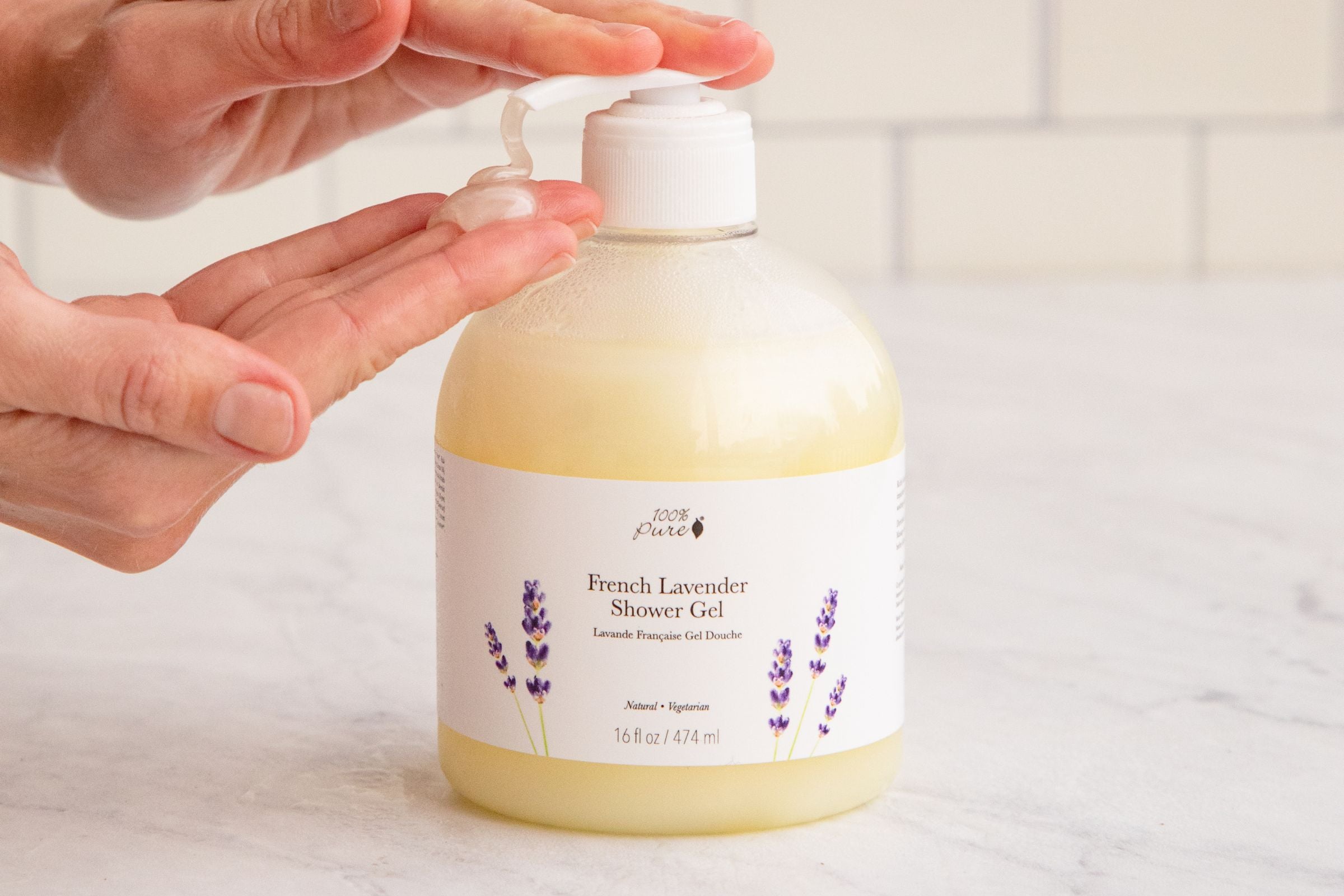Ever reach for a refreshing clean in the shower and debate between shower gel and body wash? You’re not alone! While both products leave you feeling squeaky clean, there are some key differences to consider. Delve into the world of shower cleansers as we explore what shower gel is, how it compares to body wash, and ultimately, which one might be the perfect pick for you.

WHAT IS A SHOWER GEL?
A shower gel is a liquid soap product specifically formulated for use in the shower or bath. It’s designed to cleanse the body by lathering up when mixed with water, similar to traditional bar soap but in a liquid form. Shower gels often come in various scents and formulations, offering different benefits such as moisturizing, exfoliating, or soothing properties depending on the ingredients they contain. They’re popular for their convenience and the variety of options available to suit different skin types and preferences.
WHAT IS BODY WASH?
Body wash is essentially the same thing as shower gel—a liquid soap product designed for cleansing the body during a shower or bath. The terms “body wash” and “shower gel” are often used interchangeably, and both refer to liquid soap formulations that produce lather when mixed with water. Like shower gel, body washes come in various scents and formulations to cater to different skin types and preferences. They’re convenient and effective for keeping the skin clean and refreshed.
KEY DIFFERENCES BETWEEN SHOWER GEL AND BODY WASH
While both shower gel and body wash cleanse your body, they have some key differences to consider when choosing your shower companion.
Consistency: The first giveaway is in the name itself. Shower gels have a thicker, gel-like consistency that holds its shape better. Body washes, on the other hand, are thinner and runnier, more akin to liquid soap.
Fragrance: Shower gels tend to be more fragrant, offering a wider variety of scents to tantalize the senses. This is because the thicker consistency allows for more perfume to be incorporated. Body washes often have a milder fragrance or may be unscented altogether.
Moisturizing Properties: Body washes generally have a leg up when it comes to hydration. Their formulations often include moisturizing ingredients to leave your skin feeling soft and supple. Shower gels, while not always drying, may not be as nourishing, especially for those with dry skin.
Skin Type Suitability: Because of the potential for a drying effect, shower gels are a good option for oily or acne-prone skin as they can help remove excess oil without stripping away natural moisture. Body washes, with their hydrating properties, are better suited for normal to dry skin types. Look for body washes with added ingredients like shea butter or aloe vera for an extra moisture boost.
WHAT TO LOOK FOR IN BODY CARE PRODUCTS
KNOW YOUR SKIN TYPE
For dry skin, seek out hydrating and moisturizing ingredients such as shea butter, ceramides, and hyaluronic acid. These components work to lock in moisture, leaving your skin feeling soft and supple.
On the other hand, if you have oily skin, opt for lightweight, oil-free formulas containing ingredients like salicylic acid or glycolic acid. These help to regulate oil production, keeping your skin looking fresh and matte.
For sensitive skin types, prioritize fragrance-free and hypoallergenic products to minimize irritation. Look for soothing ingredients like oatmeal or calendula, which can help calm and protect delicate skin from potential reactions. Tailoring your skincare routine to your specific skin type ensures you achieve the best results while keeping your skin healthy and balanced.
DECODE THE INGREDIENTS
When selecting skincare products, consider ingredients tailored to your specific needs. For hydration, opt for ingredients like hyaluronic acid, glycerin, shea butter, and aloe vera, which help to replenish moisture and maintain skin’s suppleness. Soothing ingredients such as oatmeal, calendula, and chamomile can provide relief for sensitive skin, calming irritation and redness.
If exfoliation is your goal, look for salicylic acid, glycolic acid, or AHAs/BHAs, but consult a dermatologist for stronger options to avoid potential irritation. Fragrance-wise, prioritize fragrance-free products for sensitive skin, while natural fragrances or essential oils are suitable for others.
CONSIDER YOUR NEEDS
When addressing rough, dry patches on the skin, opt for body scrubs containing gentle exfoliating ingredients to promote smoother and softer skin. These formulations effectively remove dead skin cells, improving the texture and appearance of rough patches.
Additionally, for specific concerns such as ingrown hairs, razor bumps, or keratosis pilaris, there are specialized products available that target these issues directly. These products typically contain ingredients tailored to address the specific concern, helping to alleviate discomfort and improve the condition of the affected areas.
CAN YOU USE SHOWER GEL AS A BODY WASH?
In a pinch, you can definitely use shower gel as a body wash! They both cleanse your skin and create lather for a refreshing shower. However, there are some key differences to consider. Shower gel tends to have a thicker consistency and might be more focused on cleansing power, potentially leaving your skin feeling a bit dry. Body washes, on the other hand, often have a thinner formula and contain more moisturizing ingredients to leave your skin feeling soft and hydrated. So, while shower gel will get you clean, a body wash might be a better choice for those with dry skin or who prefer a more pampering cleansing experience.
WHEN SHOULD WE USE SHOWER GEL?
There’s no hard and fast rule on when to use shower gel, but it generally shines in situations where you prioritize a thorough cleanse. Here are some prime times to reach for your shower gel:
- After Sweating: Following a workout or any activity that leaves you sweaty, shower gel’s cleansing power comes in handy to remove dirt, sweat, and impurities.
- Before Bed: If you tend to get oily or greasy throughout the day, an evening shower with shower gel can help wash away grime and prep your skin for a restful sleep.
- Hot and Humid Weather: In hot, humid climates, shower gel can be a refreshing way to remove excess sweat and feel invigorated.
- After Spending Time Outdoors: After a day spent hiking, gardening, or playing sports outdoors, shower gel can effectively cleanse away dirt, pollen, and other outdoor elements.
Ultimately, shower gel is a great choice whenever you need a deep clean. However, if you have dry skin or prefer a more hydrating experience, consider opting for body washes specifically formulated for women. These washes often contain gentle, natural ingredients that are kinder to dry skin.
FAQ
1. What are the typical ingredients in shower gel?
Shower gels typically contain cleansers, fragrance, and sometimes moisturizing ingredients.
2. How much shower gel should I use?
A small amount is enough! A dime-sized dollop should create enough lather.
3. Should I loofah with shower gel?
Loofahs can be irritating, so use a gentle washcloth instead.
4. How often should I use shower gel?
Daily showering is generally fine, but avoid over-washing which can dry your skin.
5. Can shower gel expire?
Yes, most shower gels have a shelf life of 2-3 years unopened. Check the expiration date on the bottle.






